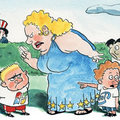The view from the Kremlin
| |
 | |
RUSSIA is a strong, sovereign and prosperous country, surrounded by enemies and traitors who are bent on undermining its geopolitical power. Upstarts such as Estonia and Poland are trying to spoil Russia’s far more important relationships with proper European countries, such as Germany or France. The freshly-baked European Union (EU) members act on the instructions of America, a hypocritical and arrogant dictator of the world order, which pretends to be a democracy but in fact is closer to the Third Reich.
This, in short and perhaps a bit exaggerated, is the view of Europe from behind the Kremlin wall, intensified by the state media, and shared by many Russians. And it is with this view in mind that Vladimir Putin, Russia’s president, greets Condoleezza Rice, America’s secretary of state, on Monday May 14th. She, seven years ago, famously argued that Russia was a weak and incoherent country.
Russia’s sense of power has been enhanced over the weekend by Mr Putin’s brinkmanship in central Asia. To the irritation of the White House, Russia has apparently persuaded Kazakhstan and Turkmenistan to build a pipeline for the export of gas through, rather than around, Russia. If it actually goes ahead this would spoil American plans for a trans-Caspian pipeline which is seen as crucial for diversifying sources of energy to Europe.
Russia’s rhetorical hostility towards America is reaching levels unseen since the cold war ended. Indeed, even in the late Soviet period anti-American propaganda was less emotional and certainly less sincere than it is today. The question now is whether the noisy words will be translated into action. That may become a bit clearer at the end of Ms Rice’s two-day long visit to Moscow.
There is a fundamental difference in how Russia and America see each other. To Russia, America is more a domestic concern than a foreign one. Russia’s sense of self-esteem has long been inseparable from its relationship with America. A confrontation with the world’s most powerful country restores to Russians a sense of purpose and urgency which had been lost in the post-Soviet years. “America is a crucial part of Russian life and its self-consciousness. America consolidates Russia’s elite and prolongs their existence,” says Lilia Shevtsova of the Carnegie Moscow Centre.
America has no such obsession with Russia. Russia is an important consideration in the country’s foreign policy—no more and no less. In the words of one Russianist in Washington, DC, it is not Russian-American relations that shape world affairs, but world affairs that shape Russian-America relations. Russia matters to America mainly as a factor in other important policy areas such as Iran and Kosovo. As a veto-wielding member of the UN Security Council, Russia has the ability and, perhaps, the inclination to block important international decisions.
One immediate concern is Russia’s position on the independence of Kosovo. Russia vocally opposes a plan by Martti Ahtisaari, a former Finnish president, that would see Kosovo become independent under EU supervision. Russia's sympathies for Serbia, which opposes independence for Kosovo, could be enough to produce a veto from Moscow. So Ms Rice is trying, during this trip, to persuade Mr Putin that Russia should merely abstain on the Kosovo resolution when it comes before the UN.
The danger of Russia blocking the UN resolution is that it would make Kosovo’s move to independence more fraught. It would also help bring to the fore the fact that the EU is divided over Kosovo. For some time Russia has been trying to split the new and old members of the union. The latest arguments in Brussels suggest that it might be succeeding. Tension is high ahead of the Russia-EU bi-annual summit which starts on Friday May 18th. For example Lithuania, which is fed up with Russian bullying and the blockage of an oil refinery, proposes to block wide-ranging negotiations with the Kremlin, to the infuriation of Germany which holds the EU’s rotating presidency. Lithuania argues it is meaningless to talk about close ties with Russia and the EU must not hide behind diplomatic niceties. That suggests a rancorous summit is on the cards. The prospect for Mr Putin's meeting with Ms Rice does not appear to be much better.



